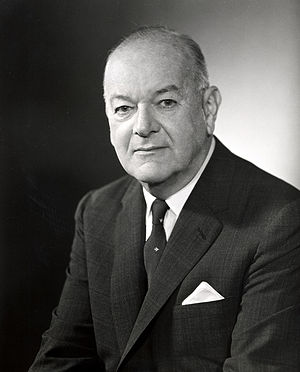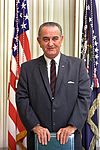C. R. Smith
| C. R. Smith | |
|---|---|
 |
|
| 18th United States Secretary of Commerce | |
| In office March 6, 1968 – January 19, 1969 |
|
| President | Lyndon Johnson |
| Preceded by | Alexander Trowbridge |
| Succeeded by | Maurice Stans |
| Personal details | |
| Born | Cyrus Rowlett Smith September 9, 1899 Minerva, Texas, United States |
| Died | Script error: The function "death_date_and_age" does not exist. Annapolis, Maryland, United States |
| Resting place | Arlington National Cemetery Arlington, Virginia, United States |
| Political party | Democratic |
| Spouse(s) | Elizabeth Manget Smith |
| Children | 1 |
| Alma mater | University of Texas |
| Religion | Baptist |
| Military service | |
| Service/branch | United States Army general |
| Battles/wars | World War II |
Cyrus Rowlett "C. R." Smith (September 9, 1899 – April 4, 1990) was the CEO of American Airlines from 1934 to 1968 and from 1973 to 1974. He was also the wartime deputy commander of the Air Transport Command, and United States Secretary of Commerce for a brief period under President Lyndon B. Johnson. He is regarded as one of the titans of U.S. airline history.
Contents
Early life and business career
Smith was born on September 9, 1899, in Minerva, Texas, to Roy Edgerton Smith and the former Marion Burck. Smith attended the University of Texas despite never having graduated from high school.
Upon his graduation, Smith worked as an accountant for the accounting firm of Peat Marwick Mitchell and later ran a number of businesses, including a Western apparel store and a firm that sold state records of new mothers to manufacturers of baby supplies. Smith's abilities were first recognized by Texas industrialist Alva Pearl Barrett, who in 1928 set up the airline Texas Air Transport (TAT), which became Southern Air Transport. Smith joined SAT as a vice president in 1929, and through a series of mergers SAT became part of American Airlines. American's owner, E. L. Cord, hired Smith to run the nationwide network based on his able management of Southern operation. In 1934, he became president of American Airlines.[1]
He married the former Elizabeth L. Manget, in Dallas, Texas, on December 29, 1934, but the bride gave up on "being married to an airline." They had one son, Douglas Smith.
In business, he was known for an informal, no-nonsense leadership style that stressed close relationships with both executives and employees. Convair president Jack Naish noted that "you can close a $100 million deal on his word alone." He generally communicated through personally typed one-page memos. Smith was said to know every American employee by name until the end of his first term as CEO. He fostered a close relationship with Douglas Aircraft that led American to become a key adopter of the Douglas DC-3 and DC-6: he was also one of the early proponents of what is now LaGuardia Airport in New York City.
One of Smith's most famous acts was the publication of an advertisement entitled "Why Dodge This Question: Afraid To Fly?" in 1934. Airline safety had been a taboo subject at the time, and Smith was credited with being the first airline manager to discuss it openly with the public. [2]
With the outbreak of World War II, Smith left American to become a colonel in the United States Army Air Forces, eventually rising to the rank of major general in the Air Transport Command; he immediately left the AAF in 1945 and returned to his airline. Due to his informal but results-oriented management style, Smith won high praise during the War. Referring to Smith and ATC commander, General Harold George, General Henry Arnold, the chief of the Air Forces, wrote that "no matter what mission I gave them, I could count on its being carried out 100%".[2] It did not hurt that Smith was close friend with the first family, and Eleanor Roosevelt would habitually call on him for travel arrangements.
In 1946, Smith began to break Pan American's monopoly in international air travel through American Overseas Airlines, leading to American's expansion overseas. He also set up the Admirals Club, the first airline lounge system. In the 1950s, he helped American become the first domestic jet carrier in the US by selecting the Boeing 707 aircraft, which came out months before its rival Douglas DC-8.
Political career
Smith was exceptionally well-connected politically, beginning with a Fort Worth and Texas base. He was close friends with many prominent Texan politicians, including Lyndon B. Johnson, Jesse Jones and Sam Rayburn. Smith was also on very close terms with the Roosevelt family, especially Eleanor Roosevelt and her son Elliott Roosevelt. C.R. introduced Elliott to his second wife, served as best man, and persuaded him to move to Fort Worth. In 1933, seeing that Eleanor (who never would speak up for herself) was often inconvenienced on her travels, Smith decided to always fly along with her on American Airlines to ensure her comfort.
Smith was instrumental in lobbying for the FAA to implement a mandatory retirement age of 60 for commercial airline pilots in large part because he was eager to remove older, expensive pilots from his cockpits and replace them with young men who would work for lower salaries and, he was convinced, would be easier to retrain for the new jet engine-based airliners. In addition, this measure would save on training costs since most younger pilots at that time had experience piloting aircraft in WWII and the Korean War. The age 60 retirement rule was publicly justified on the grounds that pilots might experience health issues past the age of 60 and that contemporary medical science was not advanced enough to test for them. This rule remained in effect from 1960 until 2007 when Congress voted to raise it to 65 on the grounds that the age 60 rule was outdated and it was now more than easy to screen pilots for potential health risks.
Mandatory retirement for airline pilots had first been proposed in the early 1950s. Commercial aviation at this time was only about 30 years old and many pilots who had begun their careers as young men in the 1920s were passing the age of 50. Some airliners, including American, had begun implementing forced retirement on their own initiatives, although others such as Delta Airlines opposed it. In April 1959, Air Line Pilot Magazine reported that Captain Deke DeLong of Northwest Airlines had just retired at 65, making him the oldest active commercial pilot in the nation, and that an estimated forty other pilots aged 60 and up were still active.
Matters came to a head over three veteran American Airlines pilots, Captains Robert Renz, Ernie Cutrell, and James Burns, all of whom had been flying for over 30 years and who were nearly deified figures in the aviation community. Their long list of accomplishments ended up having no bearing on C.R. Smith's decisions and the trio of pilots were summarily forced into retirement.
Air Force Brigadier General and FAA chairman Elwood Quesada was a strong supporter of Smith's lobbying for the age 60 rule, although his suggestion that only pilots with military experience be allowed to fly jetliners was not taken up. After resigning as FAA chairman in 1961, Quesada was rewarded with a seat on American Airlines' board of directors.
Smith's friendship with Lyndon Johnson was the principal reason for his accession to the Cabinet, and he became the U.S. Secretary of Commerce following the resignation of Alexander B. Trowbridge. Smith served until the age of 69, from March 1968, until January 1969. However, he often clashed with the civil service because of his aversion to bureaucracy: on his first day, he objected to having four secretaries and asked that three of them be fired. This culture shock caused him to leave his post early and enter a first retirement.
Smith left American in 1968. He returned in 1973, following a period of corporate mismanagement and scandal, although he retired again less than a year later, stating that he was "working in a 747 era with a DC-6 state of mind." In 1976, Smith was the recipient of the Tony Jannus Award for his distinguished contributions to commercial aviation.
Death and honors
Smith died from a lengthy illness in Annapolis, Maryland, on April 4, 1990, and was buried in Arlington National Cemetery in Arlington, Virginia.
The American Airlines C. R. Smith Museum in Fort Worth, Texas, is named after him.
Mr. Smith was inducted into the Junior Achievement U.S. Business Hall of Fame in 1976.
See also
References
- "Jets Across the U.S.," TIME, November 17, 1958.
External links
| Business positions | ||
|---|---|---|
| Preceded by
American Airways becomes American Airlines
|
American Airlines CEO 1934–1968 |
Succeeded by George Spater |
| Preceded by
George A. Spater
|
American Airlines CEO 1973–1974 |
Succeeded by Albert Casey |
| Political offices | ||
| Preceded by | U.S. Secretary of Commerce Served under: Lyndon Johnson March 6, 1968 – January 19, 1969 |
Succeeded by Maurice Stans |
Lua error in package.lua at line 80: module 'strict' not found.
- 1899 births
- 1990 deaths
- American accountants
- American Airlines people
- American airline chief executives
- American military personnel of World War II
- Burials at Arlington National Cemetery
- Businesspeople from Texas
- United States Army Air Forces generals
- United States Secretaries of Commerce
- University of Texas at Austin alumni
- Lyndon B. Johnson Administration cabinet members

